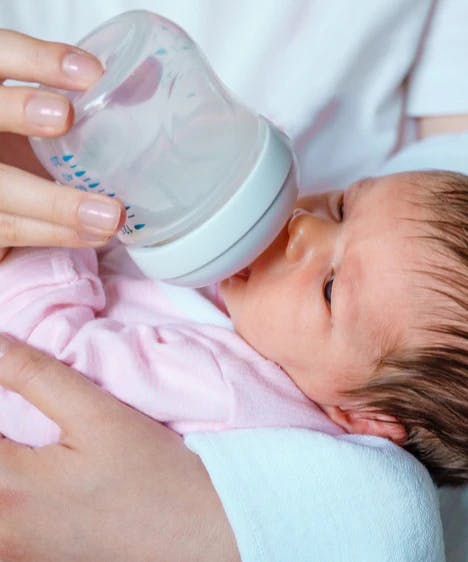Baby Formula Is Still Sold Out Just About Everywhere—Here Are 3 Reasons Why This Crisis Is Happening
In the midst of record-high gas prices and outrageously expensive groceries, our country is facing another crisis: baby formula shortage.

Just a month ago, people were starting to notice that the shelves of baby formula had fewer and fewer products. As of March 13, 29% of the most popular baby formula products were sold out. In November that number was 11%, so we've seen an enormous uptick in just the last few months. Parents were starting to panic about how they would feed their infant. Unfortunately, it doesn't look like their concern is going away anytime soon.
Baby Formula Is Still Sold Out Just About Everywhere
Roughly 40% of formula is currently out of stock around the country, and this is a twentyfold increase compared to the first half of 2021. Standard places to purchase formula, such as Walgreens and CVS, have placed a limit on how much people can actually purchase.
President Biden is under fire for his failure to handle this crisis. House GOP conference chairwoman Elise Stefanik gathered a group of colleagues outside the Capitol today to demand the current White House administration to address the nationwide shortage of formula.
"I've led on this issue since February and we, as House Republicans, continue to demand answers from the FDA," Stefanik said. "Unsurprisingly, when I reached out in February from my office to the FDA, we received no substantive response. Joe Biden simply has no plan. In fact, when Joe Biden's White House was asked about the shortage, they laughed. Shameful. Make no mistake, there is nothing laughable or funny about this crisis."
Families are getting desperate and going into emergency mode. They're even watering down the formula for their baby in the hopes that they can extend the little supply they have left.
There Are 3 Main Reasons We're Seeing a Baby Formula Shortage
Many people have been demanding to understand why a prosperous first-world country would have so many issues producing enough formula for infants. The Atlantic reported on the issue and discovered three main reasons for the shortage.
First, there were at least four babies who contracted a rare infection from the formula they were drinking; two of those infants died. The Food and Drug Administration investigated the cause and found that the origin came from a plant in Michigan. The Abbott facility contained traces of a pathogen called Cronobacter sakazakii, and the company was forced to recall several different types of their formula, including a top-selling brand named Similac.
This all happened last September, and the report shows that the pathogen likely came from a worker who touched a contaminated surface without changing gloves. However, that batch wasn't distributed. Abbott told Bloomberg that "there is no evidence to link our formulas to these infant illnesses."
The recall couldn't be the only culprit for the countrywide shortage, though. The coronavirus pandemic certainly plays a part in this mess. Lyman Stone, the director of research at the consulting firm Demographic Intelligence, explained to the Atlantic how the virus affected supply chains.
“During the spring of 2020, formula sales rocketed upwards as people stockpiled formula just like they stockpiled toilet paper,” Stone said. As "families worked through their stockpiles, sales fell a lot. This oscillation made planning for production extremely difficult. It was complicated to get an idea of the actual market size.”
Additionally, there was an increase of births in early 2022 as well as a "very dramatic decline in rates of breastfeeding." This of course meant there were more moms buying formula than usual.
The final factor that contributed to the shortage is trade policy in the U.S. Even though many formulas from Europe meet the FDA nutritional guidelines, it's often illegal to purchase here because of labeling requirements. Even the parents who disregard the FDA's regulations and try to order straight from Europe see their packages seized at the border by customs agents. The ironic part about all this is that European formula is often better than its American formula because the European Union has banned certain things like corn syrup and specific sugars and requires a higher level of lactose in the product.
Additionally, the formula that does meet FDA requirements is taxed at a high rate, sometimes more than 17%. There's also a North American trade agreement that makes it hard to import formula from Canada, a primary trading partner for the U.S. Although there are many benefits for the U.S. to be more independent and self-reliant by reducing trade with other countries, that can often lead to issues like we're seeing now.
Politicians and concerned parents everywhere are waiting for the Biden administration to step up and figure out a quick solution to this growing crisis. There are millions of babies' lives at stake.